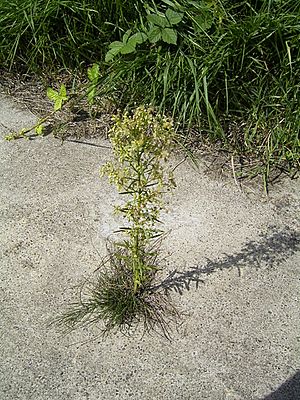Horseweed facts for kids
Quick facts for kids Canadian Horseweed |
|
|---|---|
 |
|
| Scientific classification | |
| Kingdom: | |
| (unranked): | |
| (unranked): | |
| (unranked): | |
| Order: | |
| Family: | |
| Tribe: |
Astereae
|
| Genus: |
Conyza
|
| Species: |
C. canadensis
|
| Binomial name | |
| Conyza canadensis (L.) Cronquist
|
|
| Synonyms | |
|
Erigeron canadensis L. |
|
Canadian Horseweed (Conyza canadensis) is a common species of plant. It is also known by other names like Canadian Fleabane, Coltstail, and Marestail. This plant belongs to the family called Asteraceae, which also includes sunflowers and daisies.
Canadian Horseweed is originally from North America and Central America. However, it has spread and now grows in many other places around the world, including Alaska and Hawai'i. You can often find it growing in prairies, open fields, along roadsides, in gardens, and near stream edges. It usually blooms from June to September. This plant can grow quite tall, from just 3 inches (about 7.5 cm) up to 10 feet (about 3 meters)!
Contents
What is Canadian Horseweed?
Canadian Horseweed is a type of flowering plant that is often considered a weed. This means it can grow easily in places where people might not want it, like in gardens or farm fields. It has a tall, slender stem and small, greenish-white flowers that grow in clusters.
Where it Grows and Spreads
This plant is very good at spreading its seeds. Its tiny seeds have fluffy hairs, like dandelions, which help them float on the wind. This is why Canadian Horseweed can quickly spread to new areas. It can grow in many different types of soil and climates, making it a very adaptable plant.
Life Cycle of the Plant
Canadian Horseweed is usually an annual plant. This means it completes its entire life cycle—from seed to flower to seed—within one year. It sprouts in the spring, grows tall during the summer, produces seeds, and then dies when winter arrives. However, sometimes it can act like a biennial plant, meaning it lives for two years. In this case, it grows leaves in the first year and then flowers and produces seeds in the second year.
Traditional Uses
For a long time, Canadian Horseweed has been used by different groups of people. Some Native Americans traditionally used this plant for various purposes. For example, parts of the plant were sometimes used in traditional medicine to help with certain health issues. It was also used as an insect repellent.
Modern Uses and Importance
Today, Canadian Horseweed is still studied for its properties. Scientists are interested in some of the chemicals found in the plant. While it's often seen as a weed by farmers, it's also a part of the natural environment and provides habitat for some insects.
Images for kids
See also
Do you want to learn about Canadian Horseweed in another language?
- In Spanish: Conyza canadensis para niños
 | Valerie Thomas |
 | Frederick McKinley Jones |
 | George Edward Alcorn Jr. |
 | Thomas Mensah |


